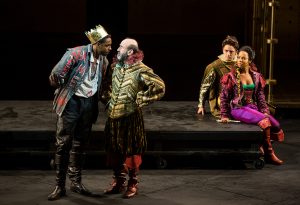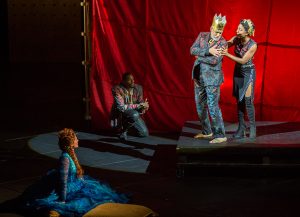Robust Globe ‘Hamlet’ Finds a Groove
Witnessing even a competent staging of Hamlet is like wandering through a magnificent museum of theatre art. At every side gleams a phrase, a character, an image, a confrontation; all elements of such quality that some lesser light might make a comfortable career from just one or two.
“Something is rotten in the state of Denmark.” “Neither a borrower nor a lender be…” “Frailty, thy name is Woman.” “Methinks the lady doth protest too much.” “Sweets to the sweet.” “The rest is silence.” “To be or not to be.”
Such are the ornaments of the world’s greatest play. The mundane materials are scarcely less impressive. Even the discards are interesting. And, with more than four hours of material available, there really must be discards, choices made among conflicting versions battered by primitive printers in the original and worn from time’s errors in the centuries since.
And yet there it survives, the glorious masterpiece among masterpieces, a source of awe and subject of endless conjecture, the whole and true story of mankind always ready to be reshaped and interpreted yet again.
This happens best with an inspired guide to lead a way through the riches: A master actor who makes the surroundings irrelevant or, even better, an interpreter bold enough to hatch and believe in an emphatic, encompassing vision.

The Old Globe Theatre’s Hamlet with, left to right, Talley Beth Gale, Grantham Coleman, Cornell Womack and Opal Alladin. Jim Cox Photo
The Old Globe Theatre’s latest version of the play is its first by Barry Edelstein, the artistic director, and a robust, worthy interpretation it is, stimulating as a full immersion in the grand tradition but also an intriguing construct inviting analysis, ranging from the casual to the confrontational.
It’s been many years (and many nights in the theatre) since I actually studied Hamlet but there’s abundant evidence that Edelstein has been doing just that in preparing this show. His program notes reflect a determined expedition among all three of the quite different surviving print versions to find what works best here and now. And I’m enjoying just following right along … with some comments.
Moving “To be or not to be” forward makes really good sense. Adding a usually-cut scene for Gertrude and Horatio towards the end doesn’t explain enough more to justify the time just as the finale is heating up. Trimming out the extra gravedigger is a good plan but the scenes all around the skull business still seem to drag.
And there seem to be some line altering. In the heat of the moment I heard “There are more things in heaven or earth, Horatio, Than are dreamt of in your philosophy,” read differently. My ear, an actor’s slip or some interpretation I missed?
But, you see, it’s all fun. Many of us have multiple Hamlets clanging away simultaneously in our mind’s ear and sometimes it’s surprising what squeezes into consciousness.
Grantham Coleman is a most satisfactory prince, especially when he seizes control and zooms about out-thinking everybody else. He’s never met anything on which he doesn’t have an opinion. He’s better with the Ghost of his father than he is with his distracted mother, played with fleshly vagueness by Opal Alladin. And his interaction with the pale and tightly-wound Ophelia of Talley Beth Gale unpacks no fresh revelations in that notoriously fraught relationship.
Edelstein has wisely invested in superior character men, a path worth including in anybody’s Hamlet map.
Cornell Womack is a loathsome, sweaty Claudius so given to endless scheming that he seems to find more pleasure in the process than the profits. When he tries praying, hedging his bets, it is no surprise at all that he frankly admits failure. He stares holes through messengers, eager for new ammo. And when he shouts “Gertrude, do not drink,” the world freezes in its tracks.

Grantham Coleman, Patrick Kerr, Kevin Hafso-Koppman and Nora Carroll , left to right, in Old Globe Hamlet. Jim Cox Photo.
Patrick Kerr offers a fresh and plausible alternative to the usual doddering old Polonius. He’s not a fool, despite Hamlet’s disgust, but a very savvy political survivor who discovers the melancholy truth that age increases wisdom at the cost of respect. Thus, while his advice to his departing son (“Neither a lender nor a borrower be,” “To thine own self be true”) is genuine and wise, his delivery has worn out with overuse. Personally, though, I would want this Polonius still to have my back.
And what a find is Michael Genet, able to make distinct individuals of the gravedigger, the Player King and the Ghost! There’s not much to do with a Ghost costumed like a minivan, but Genet makes it work, as he does the old worker juggling skulls and puns, then skittering away when the upper classes get tired of drollery. The problem for the Player King, as always, comes when this local prince stops his rehearsal to give notes. Of course, it’s a priceless scene in which Shakespeare can be heard lecturing on theatre (!) but it also is an amateur haranguing a pro. Genet makes him a very experienced pro who knows just how to deal with big donors and still get the job done.
I can’t decide about the Laertes of Jonny Orsino. He constructs a fine young fellow who shows why he’s esteemed back at school and so devastated by a father’s murder and a sister’s suicide. But why doesn’t such an admirable guy then just avenge himself with the flashing blade so admired at school? Why get involved in all these poison plots? Orsino prepares me to understand but veers away into mere villainy.

Talley Beth Gale, Grantham Coleman, Michael Genet and Christina A. Okolo in Globe Hamlet. Jim Cox Photo
The rest of the company carries wood as necessary. Ian Lassiter is as stalwart a Horatio as one could wish; Kevin Hafso-Koppman and Nora Carroll stay out of the way too much as Rosencrantz and Guildenstern. Larica Schnell is an interesting and, well, more manly Osric that usual. This is a gaudy royal court and everybody sashays accordingly.
Tim Mackabee’s set is a tangle of moveable scaffolding dominated by an immense figure in full and polished renaissance metal armor, also moveable, regrettably. Stephen Strawbridge illuminates as necessary.
When the players are preparing their court performance, Polonius complains petulantly, “I don’t like the classics in modern dress,” there’s a sympathetic audience chuckle not just at the tacked-on line but also at an irony about Cait O’Connor’s costumes, which don’t seem to be from any period. Or try all periods, from Elizabethan ruffs to sport coats covered with graffiti. The royal outfits – doublets and décolletages and diaphanous wrappers – include yards of iridescent metallic brocade, recalling Hamlet’s line on the night sky as a, “…magisterial roof fretted with golden fire…”
Two head-phoned musicians sit to one side and provide an original Curtis Moore score as eclectic as the costumes, embracing 1950s West Coast jazz (think Gerry Mulligan), klezmer emphasis and even woodwinds Shakespeare would recognize among the abstract sampling and occasional percussive whacks. This suffices far more than not and epitomizes the bold, pushy world-welcoming embrace of this refreshing show.
Thanks for the guided tour, everybody. I’d recommend it to those in the mood for some quality Hamlet.
(Continues in the outdoor Lowell Davies Festival Theatre at 8 nightly except Mondays, with some September performances at 7 p.m., through Sept. 22, 2017.)



I agree with Welton’s favorable assessment of this fine production with one exception: the incidental music was atrocious. The flamboyant costumes certainly suggested a royal court, but the grunge music these technical dolts supplied suggested a 1980s dive bar. I found their music intrusive every time it belched through the speakers.
Oh, I kinda liked the music. See http://www.talkinbroadway.com/page/regional/sandiego/sd202.html for more.
Totally agree.
The superb text and acting made this an extremely satisfying conception of Hamlet for me. The cuts and judicious reordering rang true, as did Coleman’s committed performance — a captivating blend of contemplative and manic. The troupe as a whole gave a singularly accessible presentation of Shakespearean language and well-formed characters, I thought. Overall, Edelstein’s interpretation, scripting, and direction came together masterfully.
With Ken.